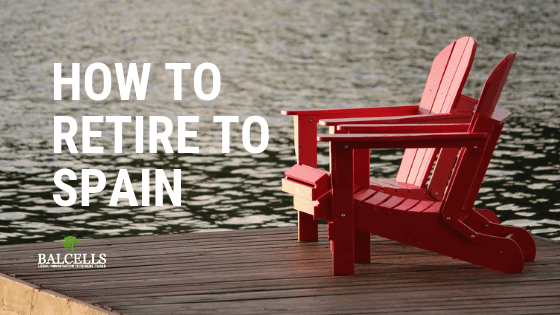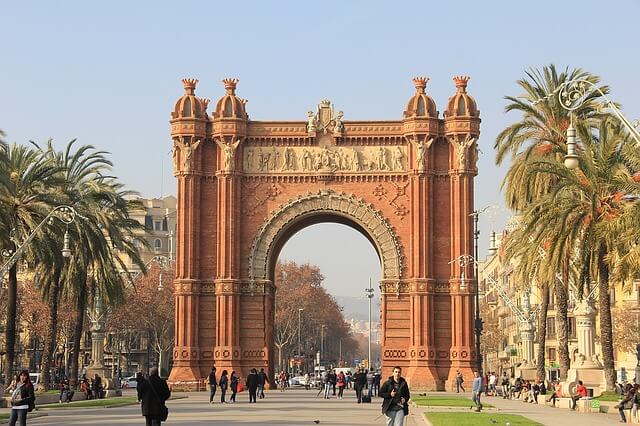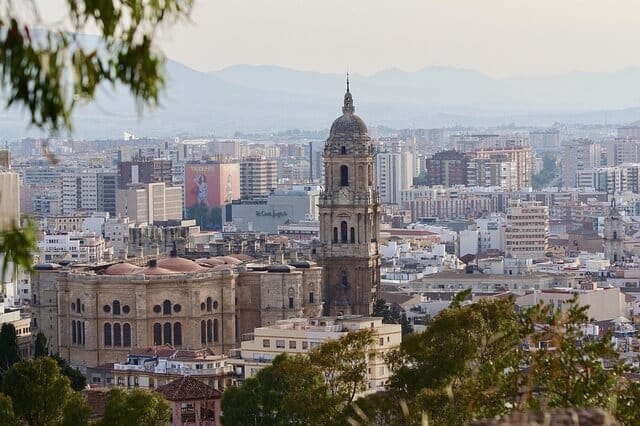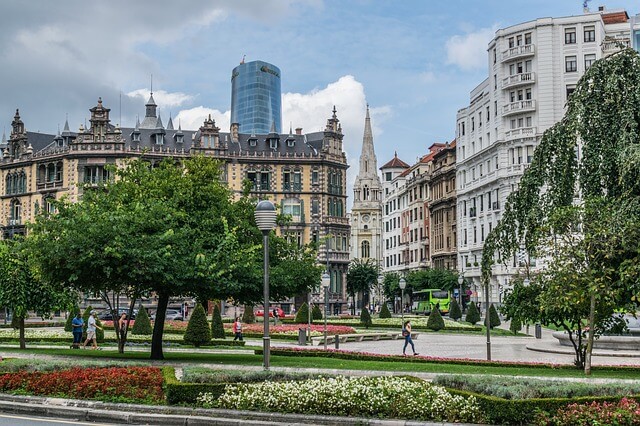We could start by highlighting everything that Spain has to offer. But let’s avoid the typical “sun, perfect weather, great food,…” statement. We all know that. So now that you are already convinced about how amazing Spain is, let’s dive deep into what’s important. The exact steps and considerations you should follow in order to retire in the country. Because, in fact, it can be really simple; provided that you know the information in this article. Therefore, let’s start learning about how to retire in Spain.
What are we going to tackle exactly in this blog post?
Which are the best cities and places to retire in Spain?
First things first.
Spain is a big country with a diverse landscape. Even though the weather might be somewhat similar across its regions, all the cities that integrate the country are completely different.
That is why, beforehand, you should start by defining where you will start your new life.
As someone who has not explored every single corner of the country, it can be a bit difficult. That is why we would like to give you 3 suggestions about the best places to live in Spain as an expat.
Of course, that decision will hugely depend on your personal interests and where you feel most comfortable. Do you prefer a more active place to stay or are you all about the mountain and relaxation? No matter what, let’s analyze our top 3 cities for retirees in Spain.
The Surroundings of Barcelona
Americans retiring to Spain love it.
Notice how we are not referring to the city of Barcelona itself. Why? Yes, undeniably this Mediterranean city is amazing, and a worldwide touristic destination. That is why many individuals who want to retire to Spain from the US choose it as their new place to stay. But that may be the problem.
If you are planning to retire, odds are that you want something more calmed and relaxed. You don’t want to experience the daily rush of people moving from one place to the other and the noisy vibes of its streets. That is why Barcelona may not be your ideal choice.
But there are tons of awesome alternatives at Stone’s through this city: its surroundings.
Towns like Sitges or Calafell are the perfect spot for those wanting to have access to a decent-sized house at a more than affordable price.
You will enjoy a calmed vibe with the beach in front of you. But without giving up to a charming vibe that will make you want to have dinner at a restaurant every single day. And, whenever you want to visit Barcelona, you will always have it next to you in a maximum of 30 minutes.
Málaga
Safe and friendly. For many the capital of the “Costa del Sol”, a city that has become a complete cultural and commercial hub.
Málaga is one of the preferred destinations of citizens abroad. The perfect weather conditions throughout the whole year will make it perfect for you in order to enjoy its charm.
Like anywhere in the South of Spain, people in Malaga like to live in the street. That is why you will find it really easy to enjoy a great glass of wine with some tapas at any terrace.
Furthermore, it’s amazing cuisine, architecture and infrastructure will delight you!
Bilbao
Finally, something a bit more alternative, which escapes the Mediterranean landscape. An Atlantic city full of surprises.
Even though there are fewer tourists and expats, Bilbao has become another great destination for them during the past years. If you’d like to explore and enjoy a different culture, gastronomy, and people, the capital of the Basque country is your go-to place.
A much more affordable place with cutting edge architectural designs (see, for example, the Guggenheim Museum). But maybe something that attracts many individuals to Bilbao is its gastronomy. Just try going from bar to bar ordering some “pinchos”, and you won’t be able to stop!
Retirement visa: the residence permit that will allow you to stay in the country
This may be the most important part of the process.
Because no matter the city you choose or the property you buy, if you don’t have a residence permit in the country you won’t be able to legally stay in the country for more than 3 months.
Therefore, which is the visa that will enable you to stay in Spain for the long run?
The retirement visa in Spain, which is called non-lucrative residency. This is the residence permit that enables you to stay in the country without conducting any economic activity; something you don’t do when retired.
It’s easy-to-meet requirements make it the ideal visa for you. In that sense, you will just be required to:
- Possess over 40.000€ in a bank account. The money can be in any currency convertible to the euro, and there is no need to have it in a Spanish bank account. Nevertheless, depending on the country you come from (China, for example), the Spanish Immigration Office will require you to have the exact amount in a bank account inside the Spanish territory. As you are also planning to live here for the long-run, our advice is to open it as soon as possible and transfer the money here.
- Having a private health insurance contract signed with a Spanish company. Bear in mind that this contract must offer full coverage within the Spanish territory.
The non-lucrative visa will allow you to legally live in Spain for one year. Once that period ends, you will be able to renew the permit for 2 and 2 more years (provided that you still meet the initial requirements).
Once the third renewal ends, you will have lived in the country for 5 years. That will enable you to get permanent residency. This is another type of permit that allows you to live for 5 years in Spain And, finally, once those 5 years finish, you can get Spanish citizenship.
*Important note. The retirement visa requires you to stay in Spain for at least 183 days per year. This, as we will see, will have an impact on the taxes you pay.
How much money do you need to retire in Spain?
We have included this question after the prior one because there is an important aspect many other sites don’t talk about.
How much money, exactly, do you need in order to retire to Spain?
Because yes, you can live in Spain with just 20.000€ per year and enjoy a more than decent life. Nevertheless, there is something we won’t be taking into consideration here.
The non-lucrative visa, the residence permit that you’ll possess, has a monetary requirement attached. And not only do you have to show the exact amount of money on the application time. If you want to renew the permit, this requirement still holds.
That is why our numbers differ a bit. As a foreigner wishing to retire in Spain, you will need, at least, 40.000€ per year in order to live in the country. That is the minimum you must be aiming at, only due to legal reasons (if you are coming with your family this number will increase).
But what is the cost of living like in Spain?
If you just take into consideration your day-to-day costs, you can more than comfortably live for 25.000€. And with 30.000€ and over you will enjoy life like a king or queen!
For sure life is a bit more expensive in the capitals (Barcelona, Madrid,…), and the days of enjoying a 10€ menu at any restaurant are over. A monthly transport pass can cost from 40 to 50€, and renting an apartment 500€ per person/month (on a decent location).
Should you buy or should you rent?
There are some factors to consider in order to make this decision.
First of all, you must bear in mind that the real estate market in cities like Barcelona and Madrid have been experiencing a drastic growth lately. This means that buying a property there is quite expensive nowadays. Nevertheless, you have the option to buy a property on the surroundings, being much more affordable.
But maybe our wisest piece of advice would be to start renting before buying.
It is highly likely that you still haven’t explored many of the cities and towns in Spain. Granada, Sevilla, Santander, Valencia,… there is much more to Barcelona and Madrid!
Therefore, our advice would be to start renting while you move and discover all the cities that you can in Spain. Then, once you have clearly defined which is the region that best adapts to your situation, you can start planning to buy.
Taxes in Spain as a retiree
Let’s now talk about something that is a headache for many: taxes.
As we previously mentioned, the retirement residence permit requires you to stay in the country for a minimum of 183 days during a year. This, immediately, turns you into a tax resident.
And what does that mean? Simply that you need to pay all taxes and at the percentages tax residents do.
We developed a guide with all the taxes in Spain for expats.
But just to give you a small introduction. Some of the taxes you’ll need to pay:
- Income tax or IRPF. You’ll need to pay taxes on the incomes you obtain worldwide (not only those obtained in Spain). The exact percentage will depend on the exact amount you earn, going from 19% to 45%.
- Capital gains tax. A 19 to 23% applied to the gain you obtain when selling assets like a property.
- Wealth tax. If you own a property or any asset valued at more than 700.000€, you need to pay from 0,2 to 2,5% of taxes over it.
The Spanish tax system can be really complicated, especially if you come from countries such as the UK in which taxes work completely differently. That is why our piece of advice is hiring an accountant that can manage your taxes. The monthly cost that it carries within is worth it: it will save you a lot of time and you’ll avoid any possible legal complications.
At Balcells Group we offer monthly accounting and tax optimization services from just 75€. Contact us at [email protected] for more information!
Retire to Spain after Brexit
Is it still possible to retire to Spain after Brexit?
Yes. Brits will still be able to retire to Spain after Brexit. Nevertheless, depending on how long they wait to formalize their legal situation, the path will be one or another.
If you are a British citizen you will be able to move to the country easily under the withdrawal agreement residency permit.
This retirement visa, as we have already seen, is called a non-lucrative visa, which lasts for one year but can be renewed easily if you still meet the requirements.
Many aspects that will define your day to day life as a British citizen in Spain will depend on the agreements between both countries. That implies that we will need to be up to date with the latest immigration news. Also, if you are looking for how to take your pet with you to Spain, do not miss our other post.
But if you want to know how to retire in the Spanish territory after Brexit now, we recommend you to read our article in which we explain how to get your resident status following the simplest possible steps.
Read here how to get your residency in Spain as a UK citizen.
Nevertheless, you may also want to talk to one of our lawyers and let us help you define what to do.
Book a consultation with one of our lawyers and solve all your doubts:

At Balcells Group we have been foreigners effortlessly moving to Spain for over 11 years. We help expats from all around the world with their immigration, business, tax and legal needs; ensuring a legally safe and enjoyable transition to the Spanish territory. Our multilingual team understands the importance of adapting to the cultural and legal specificities of our international clients. We offer a comprehensive service that combines the expertise of several generations of lawyers with the innovation needed to address today’s legal challenges, always striving to simplify processes and ensure reliable, effective results.







I have submitted all my paper work to try to recoup my Spanish nationality. My parents were born and died in Spain. I own an apartment in Almeria for many years. We would like to retire to Almeria and spend the better part of the year there. I submitted the paperwork in Almeria in April 2018. We would like to move to Spain in January 2020. We have our bank account and accounts with utilities property taxes etc paid for years. Im not sure how to proceed with the moving process. Should we get a visa???
Can your firm help me with the process of my papers from Madrid??? What would your fee be ???
Thank you for your attention
Vickie Vanderessen. American citizen
Hi Vickie,
Yes, we can help you out with the whole procedure, no matter where you are (we can assist you online).
Please, contact us and we will start as soon as possible!
Hi, what if your net worth, bank accounts, are high, but the interest received is lower than the required amount? Is it calculated only on income, or does it consider net worth as well?
Thanks in advance…
Hi Jas,
If you are referring to the income tax, it just considers the incomes you receive (in Spain if you are a non-resident, and worldwide is you are a tax resident in the country).
Hope we answered your doubts,
Kind regards!
As a retired person , who will not work , only live from retirement saving , what kind a tax liability facing , we are NOT from the UK , I’m a EU citizen , my wife is a US citizen but have recognized marriage license in EU country of mine
Hi Tamas,
As your situation is really specific, one of our tax lawyers will need to analyze it in more depth. For that, we would really appreciate if you could send us an email at [email protected] detailing a bit more your situation, so we can give you an exact answer.
Kind regards!
Im looking foward to move to Andalucia. Im a veteran and I live of my pension. I read i need at least 40grand in the bank before I move. I dont have that ammount in the bank. Can I still move with 10 grand in the bank and prove that I receive more than 20grand a year?
No, you need to demonstrate the required amount at the application moment. Regards!
Qué edad se debe tener para obtener la residencia y jubilarse en España? En mi país no te tengo la edad pero tengo la solvencia para hacerlo.
Hola Guillermo,
No hay edad mínima (ni máxima) para conseguir la residencia no lucrativa en España, así que la podrías solicitar ya mismo.
¡Para cualquier otra duda estamos a tu disposición!
Planning to retire to Spain. Australian aged pension of approx $Aud 20,000 per year. Savings approx $200,000. Looking at permanent relocation as a single person.
Would I qualify for permanent residency visa?
Hi Elsie,
Yes! As long as you can demonstrate the possession of over 30.000€ (annually), you can get the non-lucrative visa quite easily.
Send us an email at [email protected] if you need help with the whole application procedure.
Regards!
I apologize if I am premature in sending this email request after the one I sent last week. My wife and I received a long stay non-lucrative visa for Spain and established a residence in Barcelona starting in mid-November of 2016. We renewed that visa for an additional 2 years upon the initial year expiration. However, we needed to return to the United States to help with my 95-year old mother, which we did at the end of November 2018. We are now ready to return and renew for the next two years to move towards Permanent Residency. Does our absence from Spain with no registered address (we ended our lease when we departed) affect our ability to renew, provided we acquire and register a new address? What kind of help can your provide to assist us in this endeavor?
Hi David,
If the card has expired for more than 90 days, you should request the initial authorization again. Nevertheless, in that case, we would really suggest you request a consultation with one of our lawyers, as we would need to analyze it carefully in order to see what you should do.
Kind regards! 🙂
Is a 62 year old person eligible for a student study visa in Spain, to study at an educational institution? And can the 62 year old work a few hours per week while studying? Thank you
Hi Lou,
Unfortunately, it won’t be possible.
As a U.S. citizen that has resided in France for the past five years, when applying for a Spanish non-lucrative visa, it it necessary to document proof of a residence in Spain prior to obtaining the visa ?
AA”laa3i
Hi Steve,
No! There’s no need. You can apply for this residence visa without never having visited/lived in Spain.
If you need additional help with this procedure, we will be glad to help you out!
Just send us an email at [email protected]
Regards 🙂
Hi, we are US citizens living in the US but wishing to retire in Spain. Our combined gross social security income is about $36,500 per year and our net income after healthcare deductions (Medicare) is $ 32.400 per year. in case we are able to move to Spain we would cancel our healthcare deductions and our income will be $36,500 gross and net. The problem is that at the time of application for a non lucrative visa, our income won’t be enough for the visa requirements. I would like to know if the required income for that particular visa is net or gross earnings, and if our income is not enough, if we can complement the amount with savings.
Also, do we need to show the monthly income requirements plus $40k in the bank every time we renew the visa? We have some savings but we would like to buy a property in Spain after arrival. Thank you!
First of all, we would need to know in which consulate are you going to apply for the non-lucrative visa, as there are some different criteria depending on the exact place of application (requirements may vary).
In general terms, it is requested to show a current bank certificate demonstrating the possession of 26.000€ in an account + 7.000€ for each additional family member.
You can also show all the incomes you were receiving for the last 6 months and also your savings or investment account etc.
They just want to see you have sufficient funds to live in Spain without working.
I’m currently a Canadian citizen planning a move to Spain…my question is regarding a tax free disability pension I am receiving from the Canadian Government. The pension is not classified as ‘income’ and thus I do not even report it on my yearly tax filings…the pension is from Veterans Affairs Canada…how will the Spanish Gov treat this tax free pension from Canada? thanx in advance!
Hi Ian,
If the pension is public, you won’t need to pay tax in Spain for it. Nevertheless, it is always better to let one of our specialists check the double convention agreements to see the whole situation into detail.
Kind regards!
Hello, My wife and I wish to retire to the Canary Islands. I am a British citizen currently living in Canada for the past 25 yrs. I get a state pension from the Canadian Gov and a small pension from the British Gov. We will purchase a home in either Fuerteventura or Lanzarote. With not knowing the outcome of Brexit later this month, what are my best options at this time, to start procedures apply for a non lucrative visa or apply for the Golden visa ?
If a golden visa, what if the home we like is only 475000E would that qualify or does it have to be 500E + ?
Thank you
With Regards
R & D Hiscock
Roger, it won’t make any difference as for the outcome of Brexit; if you meet the requirements, the Golden Visa and the Non-Lucrative visa are and will be equally available. Nevertheless, if you start now the process, you could get your EU registry certificate. The golden visa requires a minimum of 500.000€, so 475k would not be enough (you could compliment it with any other asset, like a garage, for example, worth 25.000).
I would like to know how US traditional IRA distributions are classified for tax purposes? as pensions or regular income? and also for annuity pensions?
In order to assess what would be your best option, it would be ideal to have a consultation with you so that one of the lawyers can advise you taking into account your case. You can send an email to [email protected] to schedule it.